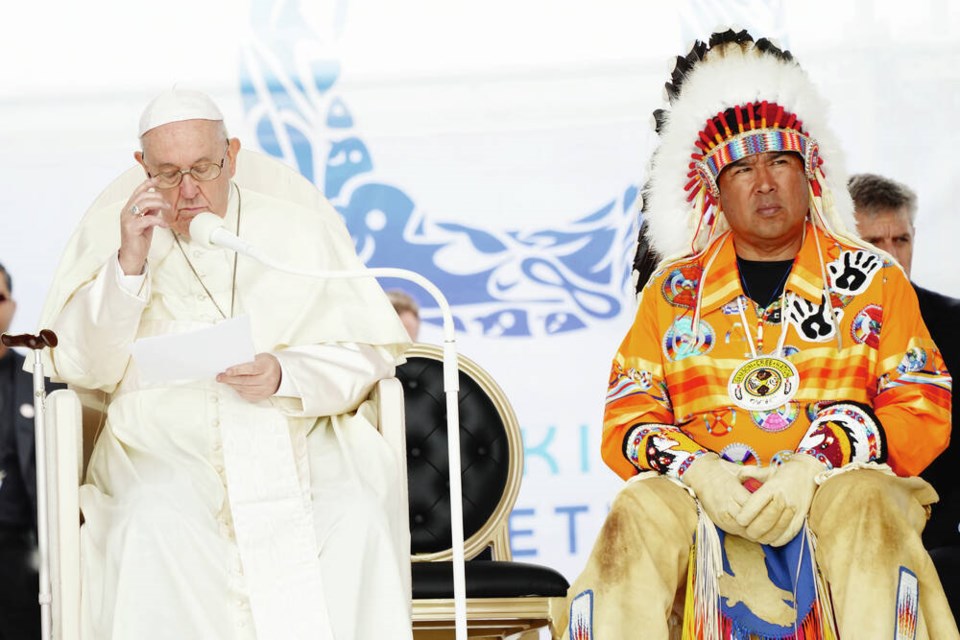The Pope’s visit to Canada paves the way for new dialogue between the church, government and Indigenous communities that can strengthen their relationships and create more opportunities for reconciliation, but three important points must be kept in mind.
A tremendous burden was placed on Indigenous communities by church and government, and lifting it off will require collaborative action that happens on equal footing and is guided by unyielding respect for those who have suffered, and those working for a better tomorrow.
In April, it finally happened.
After years of denial, avoiding the question, and providing indirect answers, the Catholic Church issued an apology for the “deplorable” abuse that over 150,000 Indigenous children suffered in church-run residential schools.
For some people, it was a landmark recognition of injustice that had the power to heal. Others were understandably cynical, suggesting it was purely cosmetic and all too easy; what good are some words after decades of abuse, nightmares, and buried children?
Pope Francis did not leave it at an apology, though.
The 85-year-old Argentinian recently landed in Edmonton for a nationwide tour and series of meetings with Indigenous leaders and residential school survivors.
He was contrite, stating: “I humbly beg forgiveness for the evil committed by so many Christians against the Indigenous peoples.”
Words are no elixir, and they will not close wounds that were opened and dug into for over a century.
But the Pope’s apology and subsequent trip to Canada do provide a historical record of the Church recognizing its wrongdoing and the suffering it caused.
It also paves the way for new dialogue between the church, government and Indigenous communities that can strengthen their relationships and create more opportunities for reconciliation.
Moving forward, there are many things that must be done to redress the damage caused to Indigenous communities throughout Canada, and here are three important ones.
The first is to do a better job connecting the past to the present. This means going beyond acknowledging that residential schools were damaging, to making the links between specific residential school policies and current inequalities.
Why is this important?
For one, it helps in identifying forms of these practices which still exist more subtly and are thus harder to spot than they used to be.
Someone able to see structural flaws that still exist is also better positioned to notice that in many respects things have not improved.
In fact, racism and hate crimes towards Indigenous people have increased over the last few years, even before the pandemic began.
The second point is for public leaders and policymakers to be more genuine in working with Indigenous communities and supporting Indigenous leaders.
For all the talk of working together, putting lived experience first, and respecting Indigenous culture and knowledge systems, there is still reluctance to adopt the recommendations of Indigenous communities, to implement Indigenous practices and to provide spaces for Indigenous leaders to exercise their capacity as changemakers.
Indigenous communities still have limited support in pursuing self-governance, and are also rarely seen in Parliament or provincial legislatures, with the number of Indigenous political representatives even shrinking in some provinces.
Indigenous leaders must not be treated as political tokens, wheeled out just when convenient, but as valued partners involved in every step of governance and decision-making which impacts members of their communities.
Finally, no approach to redress can be taken seriously if it does not include tangible measures to reduce the economic plight facing so many Indigenous persons: one in four Indigenous persons are in poverty, nearly half on reserve live in low-income households, and forty per cent are unable to afford an unexpected expense of $500.
All the apologies, tours, land acknowledgments, consultations and commemorations make little difference if someone cannot provide themselves or their family with the basics of life.
Governments must act to increase social assistance rates, which are near impossible to survive on, eliminate clawbacks that perpetuate poverty and do more to help parents balance work and school with childcare.
The church, having issued its long-overdue apologies, must also support initiatives aimed at socioeconomically empowering Indigenous communities however possible, including through ongoing honesty about what happened.
A tremendous burden was placed on Indigenous communities by church and government, and lifting it off will require collaborative action that happens on equal footing and is underpinned by unyielding respect for those who have suffered, and those working for a better tomorrow.
>>> To comment on this article, write a letter to the editor: [email protected]



